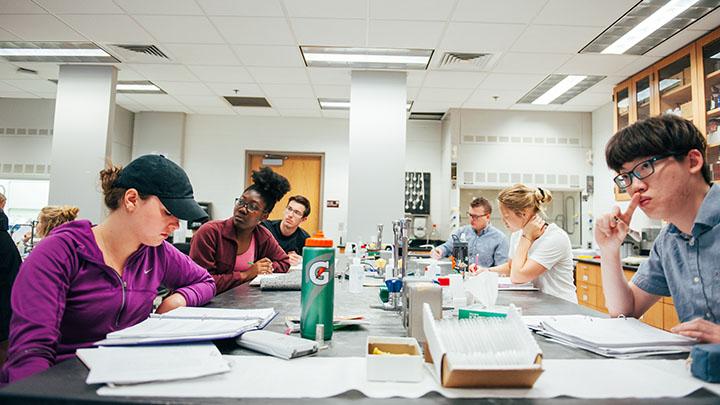Calvin receives $1 million NSF grant to increase student retention in STEM

Nationwide research shows that retention levels of first-year college students pursuing a degree in a STEM-related field (Science, Technology, Engineering, and Math) varies significantly based on a few factors, namely their socioeconomic status and family’s college history.
With that knowledge, Calvin College faculty are taking action—working on finding solutions that will even the playing field, giving every student an equal opportunity at success in STEM fields.
“If we have this systematic inequity in our society between cultures, then it’s only right that we try to reverse and eliminate some of that inequity,” said Herb Fynewever, associate professor of chemistry at Calvin College.
Fynewever is among a small cohort of faculty members who are leading the charge in curbing this trend. For the past two years, Fynewever, with full support of his department and the college, has been using research-backed methods in his Chemistry 103 classes to help students persist through their first semester. It’s an area he’s personally passionate about as he wants a student who comes to Calvin seeking Plan A to be able to stick with that plan, even if they experience an early setback.
Fynewever says that most students find it difficult to adjust to the rigors of college, but those students whose parents or siblings have college experience are better suited to normalize struggle for their student if they get a bad grade on a quiz early on or if they begin questioning whether they belong in college. That assurance that things will get better, however, may be absent for students who are coming from families who have no context on which to draw.
That’s where Fynewever and his colleagues are excited about building in additional supports.
“What can we do in the classroom and in first-year seminar and socially in the co-curriculars to make the students feel like they belong here, how do we get that message across that every student goes through this struggle and things do get better. You’ll find your social group, you’ll figure out how to do college, it just takes time.”
A $1 million boost
A handful of Calvin professors have tested out research-backed methods in their introductory classes, and have seen qualitative and quantitative measures of success. The National Science Foundation, like Calvin, has a keen interest in seeing increased retention in STEM-related fields, and has awarded Calvin College a $999,814 grant to dig deeper into this problem and to find solutions that work at a smaller, private institution.
The bulk of the six-year grant will go towards funding scholarships for low-income, high achieving students (measured by Pell eligibility) who are interested in a STEM-related field. Beginning in fall 2019, 12 students in the first of three cohorts, will each receive a $4,200 scholarship per year for four years. Each student will also receive enhanced academic and vocational mentoring, be part of an intentional STEM cohort community, and be enrolled in special enhanced sections of chemistry, calculus, and computer science courses in which research-based interventions will be utilized to enhance student learning. The goal is that these high potential/low-income students will perform and persist in STEM through their college careers and into the STEM workforce at levels equal to those of their higher-income peers.
Collaborative problem-solving
A large state school (UT-Austin) had success piloting some new methods in the STEM field in recent years, and now Calvin faculty are helping put more pieces of the puzzle together—testing to see how these methods play out in a smaller, private college context.
“Because an intervention worked at UT-Austin and worked beautifully, does that mean it’ll work at smaller institutions that have a very specific missional space?” wonders Carolyn Anderson, professor of chemistry at Calvin, and the lead writer on the NSF grant. “Is it really generalizable? And if it is, well that’s terrific, and if not, what do we need to do to realize success in our context? By replicating these techniques in our very different environment and seeing how that impacts our cohorts and the people around them, we can then make statements about how generalizable these methods are, which is critical.”
And while a few Calvin faculty have been piloting some of these practices already in their classrooms, and have seen measures of success, the NSF grant now provides funding for the college to engage an external reviewer to ensure that the analysis of the data lacks bias and can be validated and published externally. The NSF grant allows Calvin to take a problem they care about for their students and provide leadership to other higher education institutions.
“This [NSF grant] formalizes it, shifts it [retention of all students] from being something we do because we want it to be better, to we want it to be better and we want other people to know this can be done in other environments,” said Fynewever.






